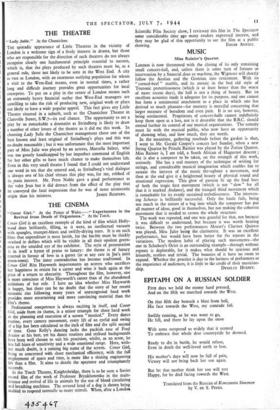THE CINEMA
" Cover Girl." At the Prince of Wales.—" Experiments in the Revival from Death of Organisms." At the Torch.
Cover Girl is an excellent example of the kind of film which Holly- wood does brilliantly, filling, as it were, an intellectual vacuum with spangles, trumpet-blasts and swiftly-drying tears. It is on such films that expenditure is most lavish, for the bauble must be thickly swathed in dollars which will be visible in all their opulent green- ness to the unaided eye of the exhibitor. The style of presentation is in itself a hymn of praise to luxury: the theme is of luxury rejected in favour of love in a garret (or at any rate in Joe's joint down-town). The inner contradiction has become traditional. In Cover Girl Rita Hayworth impersonates an actress who sacrifices her happiness in return for a career and wins it back again at the price of a return to obscurity. Throughout the film, however, one is more conscious of Miss Hayworth's career than of the abandoned ambitions of her role. I have no idea whether Miss Hayworth is happy, but there can be no doubt that the story of her recent meteoric rise following many years of unrecognised hard work provides more entertaining and more convincing material than the film's theme. •
Professional competence is always exciting in itself, and Cover Girl, aside from its theme, is a minor triumph for sheer hard work in the planning and execution of a screen " musical." Every dance routine, every camera movement, every lift of an eyelid and swing of a hip has been calculated to the inch of film and the split second of time. Gene Kelly's dancing lacks the puckish ease of Fred Astaire at his best, yet his dance routines and stylised backgrounds have been well chosen to suit his precision, whilst, as an actor, he lets fall hints of sensitivity and a wide emotional range. Here, with- out much doubt, is a coming big name of the screen. Cover Girl, being so concerned with sheer mechanical efficiency, with the full employment of space and time, is more like a shining engineering Job than a flint It aims to dazzle the spectator and triumphantly succeeds.
At the Torch Theatre, Knightsbridge, there is to be seen a Soviet record film of the work of Professor Bryukhonenko in the main- tenance and revival of life in animals by the use of blood circulating and breathing machines. The severed head of a dog is shown being enabled to respond normally to many stimuli. When, after a London Scientific Film Society show, I reviewed this film in The Spectator some considerable time ago many readers expressed interest, and they may be glad of this opportunity to see the film at a public


























 Previous page
Previous page